Corner kitchen sink cabinets: types and subtleties of choice
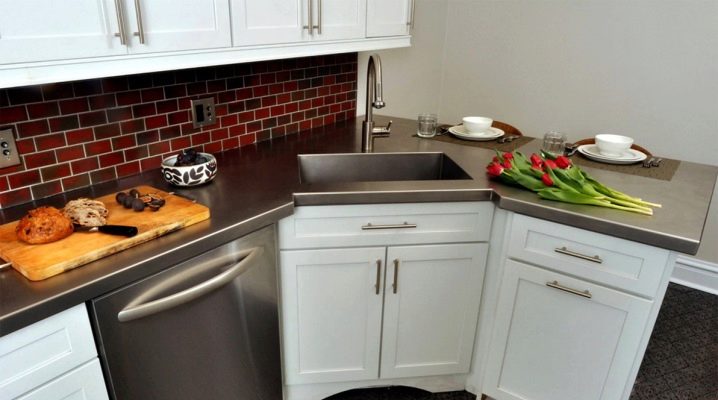
Each time, approaching their kitchen set with a corner cabinet, many housewives are struck by the thought: “Where were my eyes when I bought this? The sink is too far from the edge - you have to work at an angle all the time. The door is too narrow - you can't get anything from the far corner. "
A cabinet with a sink is a kitchen element that is constantly used in a large family. This workplace should be very comfortable and preferably multifunctional, since the corner is a fairly large space. So, it's time to figure out what kind of cabinets and sinks are for them.
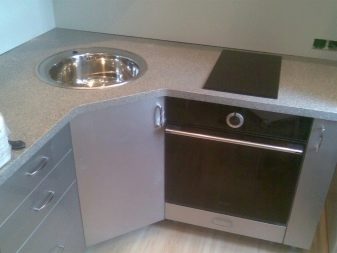

Design features
First you need to figure out why we are talking about corner structures.
- Firstly, for many, a corner kitchen set is a forced necessity: the size of the kitchen is not large enough to accommodate everything you need along one wall.
- Secondly, the corner cabinet for the sink plays a connecting function between the cabinets along the two walls.
- Thirdly, the corner floor-standing kitchen cabinet is much larger than its direct counterparts and, accordingly, will accommodate a larger number of kitchen utensils.
- Fourthly, this place is almost always used for installing a sink, which means that a siphon, pipes, technical communications will be hidden in the cabinet. Here, many people install a water filter, a floor-standing water heater. There is almost always a trash can here.
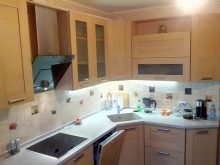
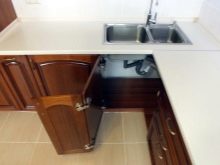

Thus, the corner cabinet for the kitchen is a godsend, because:
- space is used rationally;
- the functionality of the cabinets is increased;
- the kitchen becomes more comfortable;
- the hostess is more comfortable when the necessary things are at hand.



This part of the headset can be uncomfortable if:
- one narrow door was made, which does not make it possible to get and put the necessary thing in place, to clean the closet;
- the sink is installed too far from the edge or an unsuccessful model has been selected;
- the fittings of the curbstone and adjacent cabinets interfere with opening and closing the doors;
- a plate is located next to it: from its heat, the walls and the door of the curbstone dry out faster, as a result of which it breaks down earlier than the entire set.
All these features must be considered when choosing a kitchen floor cabinet with a sink.


Varieties
In stores, you can most often buy a kitchen set with an L-shaped corner sink or with a trapezoidal cabinet under the sink. But in more expensive salons or to order, you can purchase a kitchen with a radius corner. They will differ from each other in capacity, quantity, appearance and method of opening the doors.
L-shaped cabinet is two perpendicularly standing cabinets. It is easier to make it, but if it really has a partition inside (that is, two cabinets are simply connected), then this is very inconvenient.
The sloped cabinet has a large interior space, high functionality and a higher price.
Kitchen sets with rounded corners are very individual and therefore much more expensive.



The sink and the way it is installed will be of great importance. Washing can be:
- invoice, when the sink is installed exactly to the size of the furniture in a special niche with sides;
- mortise, when a hole is cut in the countertop, and the sink is inserted into it from above;
- under-table, when installation is made before installing the table top, from below;
- integrated, when the countertop with the sink looks like it is hollowed out in a piece of stone.



The most inexpensive ways to mount a cabinet with a sink are when the sink is overhead or inset.Under-table mounting is much more difficult and takes longer. Integrated - the most expensive, it is possible to manufacture according to the customer's size.
The sinks themselves are also different: with one to five bowls, with a wing for draining water, with a grate for drying dishes, vegetables and fruits. And the shape of the sinks also differs: they can be rectangular, square, round, trapezoidal, oval.



Materials used
Manufacturers today offer kitchen sets made from very different materials. More often this is a combination, when the walls, doors, tabletop are made of different materials.
- Natural wood. Durability, reliability, beauty - they love wood for this. The facade can be decorated with curly carvings. But taking care of the tree is quite problematic: it swelled from moisture - it will quickly rot, dry - cracked, a grinder beetle started up - soon you will have to buy a new set.
- Chipboard (particle board) Is a popular material for inexpensive furniture. The service life will largely depend on the finishing method. Now more and more often they use laminated film (chipboard) for this. It protects well from moisture and is easy to clean. The huge selection of colors is also a plus. And the disadvantages include: Particleboard is very hard, textured finish cannot be done.
It is also important to choose high-quality material: the E1 formaldehyde resin index is more environmentally friendly than E2.


- MDF (Medium Density Fibreboard) - medium density fiberboard. The sawdust size is minimal. They are held together by soft paraffin and plastic lignin. The result is a durable, moisture-resistant MDF that lends itself to fine processing. Easy to paint and paste.
- Fiberboard (fiberboard), or hardboard, is used as the back walls of furniture, the bottom of drawers. Plywood plays a similar role.
- Multiplex - thin wooden strips of different species, glued in different directions. Cheaper than wood, high moisture resistance, low susceptibility to deformation - these are the qualities for which buyers love the kitchen furniture from the multiplex. This is a natural material, therefore it is more expensive than chipboard and MDF.

- Stainless steel is used for the facade. This is durability, easy maintenance, increased heat resistance. But it will not suit every style.
- Colored plastic for doors Is brightness and strength. Modern plastic is quite reliable, yet lightweight. It is easy to look after him.
- Tempered glass also make doors and countertops. But in the case of a corner kitchen cabinet, it can only be frosted glass or tinted glass to hide the contents of the cabinet. And it is more problematic to take care of glass: scratches, chips, cracks are possible, since this is the most frequently used base cabinet.
- Countertops are made from the same materials. But the most expensive option is artificial or natural stone. Most likely, it will be custom-made furniture.
Artificial and natural material has pros and cons: durability, resistance to damage, but at the same time high price.


Dimensions (edit)
The corner kitchen cabinet is part of the headset. When choosing a cabinet, you need to take into account that rectangular sinks are suitable for elongated rooms or narrow headsets (less than 60 cm). Square sinks are handy in small kitchens. Round are the most versatile.
Standard sizes of sinks: 40 * 50 cm, 50 * 50 cm, 50 * 60 cm, 60 * 60 cm. At the same time, for round sinks, sellers indicate not only the diameter, but also the length and width of the sink. The depth is 15–25 cm. When making custom-made furniture, the sink is often also made according to individual dimensions.


The cabinets themselves have the following standards:
- L-shaped: table top - 87 * 87 cm, shelf depth - 40–70 cm, height - 70–85 cm;
- trapezoidal: on each wall - 85–90 cm, height - 81–90 cm, there may be no shelves at all, or they are very small along the short walls.
The main thing is to take into account not only the depth, but also the height when choosing the height of the furniture, so that you do not have to wash the dishes from the stool.


How to choose?
In order not to make a mistake in buying, you need to clearly understand what you want from furniture:
- more space in sloped pedestals;
- doors can be hinged, hinged (single, double, accordion);
- free access to the far wall, which means that the door is unlikely to be single;
- put a water heater in a cabinet, which means there will be no room for wall shelves - you should think about small swivel shelves;
- there will be a trash can: you need to look for models with an opening lid or a pull-out bucket;
- if there are no shelves in the cabinet, you can purchase several baskets for various little things;
- there are options for furniture with drawers;



- the shape of the sink should be in harmony with the shape of the kitchen;
- you need to choose the method of installing the sink depending on who will mount the headset, in addition, you need to be sure that the master will be able to install the bowl in the way you need;
- countertop: the desired material, its practicality and durability;
- appearance of the future purchase, compliance with the general design of the premises.
And it will not hurt to be sure that you can independently measure the dimensions of the future headset correctly. It is necessary to take into account the baseboards and pipes, the size of the canopy of the countertop, the distance from the edge of the sink to the edge of the table. Stores and workshops offer services for measuring furniture before buying at home. This is often a sure way out of the situation.

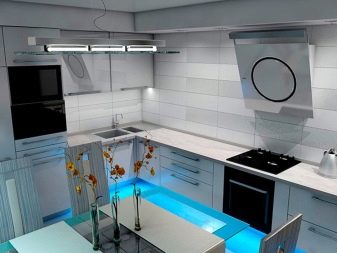
Successful examples
The base corner cabinet will help you to use the kitchen space much better, make it functional and cozy.
- Multi-section sinks will allow you to simultaneously wash vegetables, defrost meat, dry cups / spoons. If you also have fenders to drain the water, this will keep the countertop dry.
- Roll-out elements are a godsend for corner pedestals. But if you need to get to the back wall of the cabinet, you will have to dismantle part of the cabinet filling.


- Swivel mini-shelves are very convenient for a sloped cabinet: it is easy to get what you need.
- Furniture with a curved radius corner allows a more convenient approach to the sink and does not interfere with work.


See the following video for the assembly of the corner kitchen.













The comment was sent successfully.